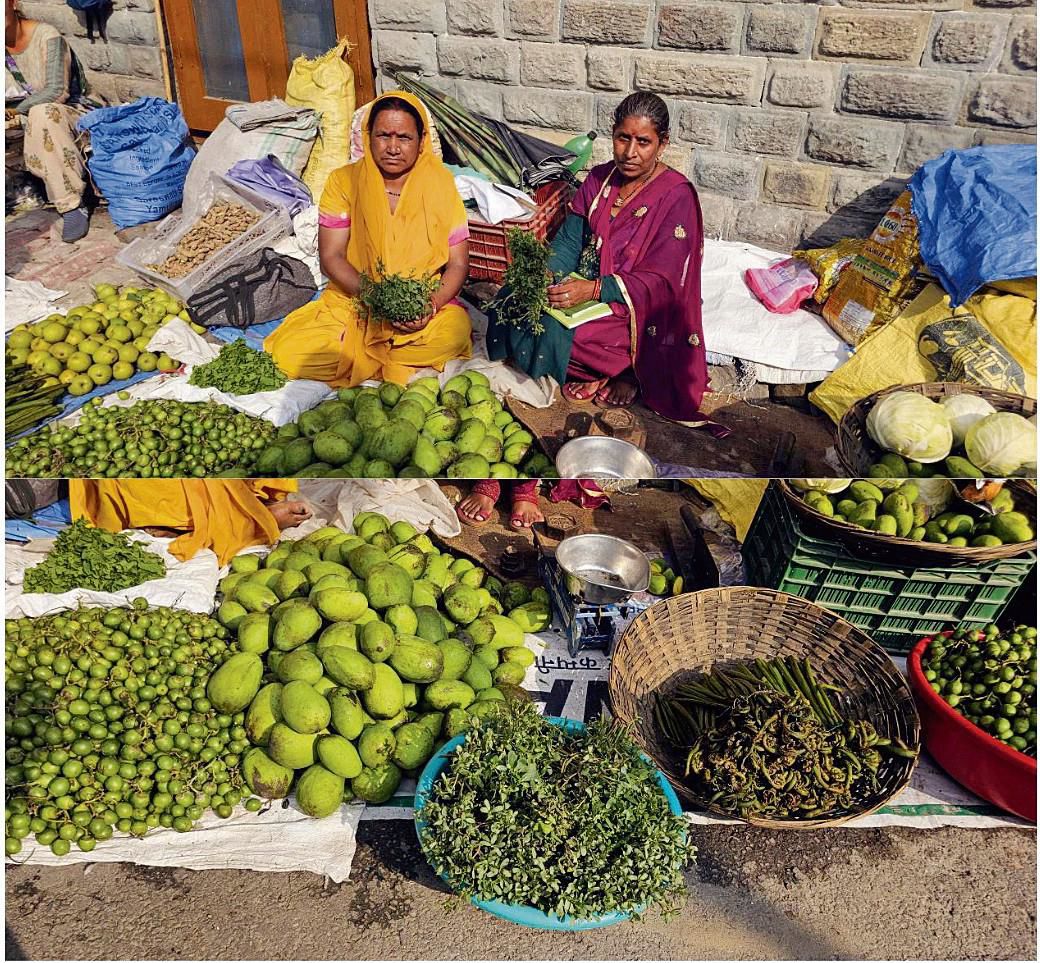
Women sell wild edible plants (WEPs) in Mandi.
Dipender Manta
Mandi, April 21
Tara Devi Sen, Assistant Professor (Botany Department) Vallabh College, Mandi, said wild edible plants were a guarantee for a sustainable food system in the country.
“There are about 2,60,000 flowering plants in the world. Out of these, 20,000 plants can yield some edible plant parts — root, stem, leaf, flower, fruit or seeds — and can contribute towards food and nutritional security for humans,” said Sen. “However, out of these 20,000 edible plants, only 3,000 have been used for sustenance by man so far, and only 150 plants are being cultivated on a commercial scale. Rest are harvested from the wild. However, most of these wild edible plants (WEPs) are not known to the world outside their region of occurrence or use.”
She said it is important that these foods be popularised and cultivated to ensure food security humanity, beyond the borders of the state.
“The present global food system is believed to be capable of providing enough calories to the world. However, there are still millions who experience hunger or do not have access to a nutritious diet,” Sen added.
She lamented the fact that the available plant resources were underutilised, leading to food scarcity, high cost and an unreliable supply of healthy food in many parts of the world.
“According to a World Health Organisation report (2020), approximately two billion people are expected to suffer from quality food and micronutrient deficiencies in the forthcoming years, making them more susceptible to diseases. As a solution, it is essential to include pure food items in our plates. So, people around the world have started looking for chemical-free, immunity-boosting food,” she added.
“To feed the growing human population amid the shrinking of agricultural land, we need more yields and, for this, use of chemical fertilisers and insecticides is a common practice in modern farming. Many studies also link the presence of pesticides and chemicals in food items to serious health issues,” she said. “Although organic farming — in which the use of chemicals is negligible — is being promoted, it is difficult to get food items that are entirely chemical-free.”
Sen said the search for cheap and alternative sources of healthy and nutritious food is the focus across the world at present. “According to some reports, about one billion people in the world use wild foods on a daily basis. However, this produce is season-specific and mostly fulfils local needs,” Sen added. She said, “Since ages, WEPs have been part of our food system, and if they were absent from our food system, the difference between the demand and the supply would be much wider. They were also the means of survival during drought and famine. However, with modernisation, urbanisation and westernisation, the importance of WEPs has been overlooked by many, especially those hailing from rural communities.”
According to Sen, the state, being a part of the Western Himalaya area, is rich in floristic diversity, which is an excellent source of WEPs, many of which are unique to this region. Their produce can be sold both raw and processed all year round.
However, despite their high market value and high demand worldwide, the produce of many WEPs native to the region is not utilised to its full potential, she added, noting that it was primarily due to the ignorance of locals towards the vast potential of WEPs, lack of market opportunities, constraints of hilly terrain — vagaries of weather, fragility, marginal land, inaccessibility — and lack of adequate infrastructure.
“As a result, WEPs are not utilised appropriately with respect to their optimum potential and get wasted at the resource level. However, in the current scenario, it is not possible to maintain demand and supply of healthy food without minimising wastage. For this, we need to strengthen the supply chain of fresh harvest and surge the processing and value-addition. This can be done by sustainably harvesting, processing, grading, value adding, certifying and distributing the harvest within a timeframe,” Sen said.“Traditional recipes need to be revised and circulated to target groups such as entrepreneurs, self-help groups, sellers, hoteliers, restaurateurs. The state, being popular among tourists, is the destination for ‘all the season and all the reason’. So, the unique WEP recipes of this region can be popularised through culinary tourism development. It will also help in livelihood promotion, conservation of traditional knowledge and culinary traditions.”
Join Whatsapp Channel of The Tribune for latest updates.




























